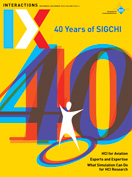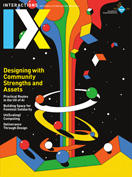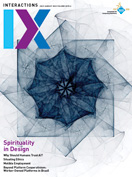Authors:
Eunice Sari, Aaron Quigley, Yoshifumi Kitamura
Six years after CHI 2015 Korea (chi2015.acm.org), the CHI conference is returning to Asia. In 2021, CHI will be held in the Land of the Rising Sun, Japan. Not only a popular tourist destination, Japan is also one of the most active countries for research and one that provides some of the biggest funding for research in science and technology (bit.ly/japan-research-funding). Japan also has a significantly growing HCI community, as indicated by ACM SIGCHI website analytics data, where Japan has the third-most visitors after the U.S. and the U.K. This is in addition to the growth in the number of papers from Japanese authors in SIGCHI conferences and the numerous SIGCHI conferences hosted there.
While learning about CHI 2021, I had the privilege of speaking with CHI 2021 general co-chairs Aaron Quigley (University of St Andrews, Scotland) and Yoshifumi Kitamura (Tohoku University, Japan). While the conference in Yokohama is a long way from now, the planning started over three years ago. Both chairs have a strong connection with Japan and are passionate about bringing people to Japan and connecting the Japanese research and practice community with the broader SIGCHI community through the conference.
The CHI 2021 philosophy is represented with a famous Hokusai wave with many color strands and the tagline Making Waves, Combining Strengths. Each strand represents the different trajectories that people approach when they attend a CHI conference. CHI 2021 has a unique plan to design diverse and mixed programs to engage all attendees. People may come to CHI for the first time with a single individual mindset and a sole purpose to present their paper. However, it is envisioned that everyone will be able to learn and engage with something new, so they will never be the same.
According to Quigley, CHI 2021 can consider four groups of people who will attend CHI: 1) HCI people who have been to Japan, 2) HCI people who have never been to Japan, 3) HCI people who are from Japan and active at CHI conferences, and 4) the local Japanese HCI community members who have never been to CHI.
We are encouraging those HCI people who have been to Japan before to be an advocate for the conference in their communities. However, those who have never been to Japan are asked to come with an open mind and to be prepared to learn about HCI in a new context. For Japanese people who are active at CHI, we ask: How can you can be the bridge for HCI people in Japan who are not yet well connected to CHI? Combining our strengths starts now, as we find ways to mix up the experience for delegates.
Those who have never been to Japan are asked to come with an open mind and to be prepared to learn about HCI in a new context.
CHI 2021 aims to address the issues of diversity and internationalization, despite cultural barriers. The collaboration of many different elements is crucial to make CHI 2021 a success. To help facilitate this, the ACM SIGCHI Asian Development Committee (ADC) has also been working with local communities to grow the Asian community and prepare them for CHI 2021. The work of the ADC has resulted in not only the growth of chapters in Asia but also the emerging initiatives to educate people about HCI through local chapter activities, such as Summer and Winter Schools in Southeast Asia, China, Bangladesh, and India; Benkyoukai in Japan; the CHI Writing Club in Thailand; HCI Symposia in Malaysia; and international HCI and UX conferences, workshops, hackathons, and community outreach in Indonesia.
We hope that you will find your own strand to be part of CHI 2021 and that you come ready to learn, share, and develop as we combine our strengths in new ways. Do not hesitate to contact the CHI 2021 chairs if you are interested in being part of this wave.
Eunice Sari is the ACM SIGCHI vice president for local chapters as well as Asian Development Committee liaison for Southeast Asia. She co-founded the Indonesia ACM SIGCHI chapter, the first ACM SIGCHI professional chapter in Southeast Asia. In addition, she is also the CEO and co-founder of UX Indonesia (Indonesia) as well as Customer Experience Insight Pty Ltd (Australia). [email protected]
Aaron Quigley is the chair of human-computer interaction at the University of St Andrews in Scotland. He is director of the Scottish Informatics and Computer Science Alliance (SICSA), a collaboration of 14 Scottish universities. In addition, he is the ACM SIGCHI vice president for conferences and will serve as general co-chair for the ACM CHI conference in Yokohama, Japan, in 2021. [email protected]
Yoshifumi Kitamura is deputy director and professor at the Research Institute of Electrical Communication, Tohoku University. He serves as the Japan liaison of IFIP TC-13, Japan liaison and chair of ACM SIGCHI Asian Development Committee, chair of Japan ACM SIGCHI Chapter, and steering committee chair of ACM VRST. He also served as ACM SIGGRAPH Asia 2015 conference chair, and will serve as general co-chair for the ACM CHI conference in Yokohama, Japan, in 2021. [email protected]
Copyright held by authors
The Digital Library is published by the Association for Computing Machinery. Copyright © 2019 ACM, Inc.








Post Comment
No Comments Found